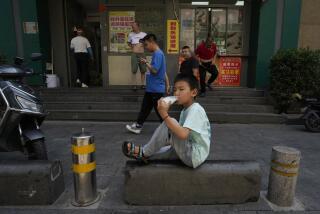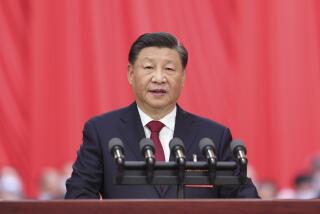China rejects risk of export slump
- Share via
China’s central bank dismissed predictions that exports would collapse because of the U.S. economic slump, signaling that it may allow further gains in the yuan.
“Some think drastically weakening external demand may lead the economy to a hard landing and that we should loosen policies,” the bank’s financial research institute said in a report. Analysis of exports should be objective and “not exaggerated,” it said, adding that a “drastic” slowdown in shipments won’t come soon.
China faces inflation close to a 12-year high and cooling global demand abroad for the products it makes. The report shows that the People’s Bank of China regards rising prices, a problem exacerbated by last month’s earthquake, as the bigger threat facing the world’s fastest-growing major economy. A stronger yuan would help by reducing the cost of imported goods.
“We do expect an increase in the pace of appreciation of the yuan through the balance of the year,” said Lawrence Goodman, head of global emerging-market currency strategy at Bank of America Corp. in New York. “Growth in China remains continuous.”
The yuan has gained more than 5% versus the U.S. dollar this year after a 7% gain in 2007. A stronger currency reduces import costs and may stem the flow of cash into the economy by increasing export prices.
China’s economic growth slowed to 10.6% in the first quarter from 11.9% for all of last year as export growth cooled. Overseas shipments rose 22% in April, down from the 31% gain in March.
The slowing of the economy remains “moderate,” the central bank said. “The overall economy is turning from heated to stabilized.”
The earthquake, which has left more than 87,000 dead or missing, will have a limited economic effect compared with previous disasters in Japan and Taiwan, the central bank said. It may add short-term pressure for prices to rise and lead to an acceleration in fixed-asset investment.
“Large-scale reconstruction of buildings, roads and other infrastructure in the earthquake zones may push fixed-asset investment growth higher,” the bank said. “The impact on consumer prices may be short-term, but one should not ignore the impact on upstream producer prices as demand increases in the near future for cement, steel, copper, aluminum and other construction materials needed for reconstruction.”
Controlling inflation will be “tough” this year because of higher costs for energy and labor, rising grain prices and the risk that rebounding loan growth will fuel demand.
Inflation quickened to 8.5% in April, up two percentage points from December, when the central bank last raised interest rates. The benchmark one-year lending rate is 7.47%, and the equivalent for deposits is 4.14%. The proportion of deposits that banks are required to set aside as reserves is a record 16.5%.
“Significant interest-rate increases are pretty much off the agenda,” said Mark Williams, an economist at Capital Economics Ltd. in London, citing government concern that higher rates would attract more money from abroad into China’s economy.
Exports won’t cool “drastically” soon because the nation’s products remain competitive, the likelihood of a recession in the U.S. has lessened and shipments to Europe and emerging markets are increasing, the central bank said in the report.
“A slowdown in export growth in the short-term will help adjust China’s export structure,” by reducing the nation’s dependence on overseas sales, which has led to record trade surpluses, tension with the U.S. and Europe, and inflows of money that may fuel inflation, it said.
More to Read
Inside the business of entertainment
The Wide Shot brings you news, analysis and insights on everything from streaming wars to production — and what it all means for the future.
You may occasionally receive promotional content from the Los Angeles Times.










